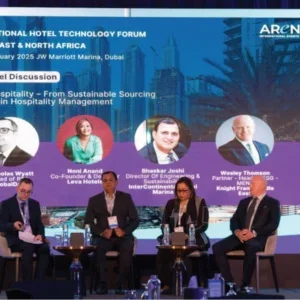
Pablo Picasso once said, “Every child is an artist. The problem is how to remain an artist once we grow up.” Looking back at my 11 years of mentoring students in international hospitality and tourism management, I have been consistently moved by the childlike ability to imagine, morphing into creativity, unadulterated problemsolving abilities and raw simplicity of thought. Just like every child is an artist, every successful student is already a leader within. The challenge is how to support them in honouring this innate knowledge once they grow into leadership roles.
My 35 years in hospitality, 26 of which spent in senior leadership roles, are mirrored by an almost bibliomaniacal collection of academic and self-help books of management and leadership, organisational behaviour and business psychology. Cornell University School of Hotel Administration and the University of Edinburgh Business School have provided me with an invaluable foundation in hospitality and the wider business environment, with teachings that I will cherish for the rest of my service. And yet, just like a marathon without a finishing line, the itch of understanding, cultivating, fostering and nurturing inner skills for sustainable and impactful leadership has guided me to further explore how each individual can continue their lifelong growth, especially in the face of unprecedented uncertainty, with a more human approach.
Almost every management leadership book commences with something like “the world is changing ever faster, faster than any organisation can cope with”. And yet, as researchers have been tracking the levels of uncertainty across the world since the Second World War, the World Uncertainty Index is evidencing that events such as the 1961 Bay of Pigs invasion and the 2008 economic crash pale into insignificance when we compare them with the intensity and relentlessness of the past 12 years, compounded by the erratic and volatile US elections, the pandemic, Brexit and the war in Ukraine. And, if this was not enough, as we barely manage to navigate and stay above the waves of change, AI models have gradually, then suddenly, progressed from beginners to ‘superhumans’ at a huge number of tasks. They can pass the bar exam and write 40% of the code for a software engineer. The computing power of computers used to train AI models have increased by a factor of 100 million in the past ten years. When investigating the specific moment at which the computing power dramatically rose, it has been within the past two years.
Catering for clients amid a chaotic world
What does all this mean? It is clear that more of the problems we are facing, and are going to face in future, cannot be solved by merely using our past experience as our benchmark. Indeed, we are no longer able to make good predictions based solely on our know-how or intelligence. The complexity of today’s issues is now beyond our lifetime experience and knowledge. We have reached our experiential use-by date. Our monumental employment challenges are threatening the stability and sustainability of the global hospitality industry and the leadership skill development of 20 million hospitality managers is critically underresourced and not fit for purpose.
To aid our search for a different kind of non-linear thinking that will prove more useful in the modern age, RESILIRE has partnered with the INNER DEVELOPMENT GOALS (IDG), a non-profit organisation for inner development, and ‘matched’ our psychological practice with its framework of skills and qualities that relates to what is needed to successfully work with complex societal issues.
IDG’s key questions ask whether today’s leaders are equipped to deal with tomorrows issues and what skills do leaders need to help them address today and tomorrow’s challenges? To support existing leaders, their legacy and the generation of leaders in the making, self-awareness, psychological safety and compassionate leadership are three concepts from psychological science that have now become essential.
The IDG also identified what skills we need to develop to meet the leadership challenges of our time, then grouped these 23 skills into five categories in a process led by the University of Gothenburg, Sweden. While all 23 skills merit attention, when 1,000 experts were asked what the most important leadership skill is for our current and future leaders to thrive, 813 of them ranked self-awareness as the most important.
During the evolution of the human brain, our cortex grew so we could learn, interpret situations and generate memories. A truly remarkable kind of selfawareness developed called metacognition.
Sure, it is a big and fancy sounding word. Do not be afraid, however; simply put, metacognition is about knowing when you know something, knowing when you do not know something and knowing what to do when you actually do not know something. Therefore, metacognition is essentially strategic self-awareness.
Now that scientists have demonstrated that intelligence and self-awareness are independent of each other, while intelligence helps us to get things right, it is our metacognitive sensitivity that allows us to know when we are wrong. In other words, people with higher metacognitive sensitivity make better predictions in the presence of uncertainty.
Self-awareness has been identified as a meta-skill with the broadest reach of impact and great benefits: ■improves decision making and team performance
■reduces conflict and supports resolution,
■predicts self-development, acceptance, and productivity
■supports self-control, creativity, pride, and self-esteem.
Surprisingly, 95% of people think that they are selfaware, but research suggests that only 10–15% of people have good self-awareness.
As simple as self-awareness
As the readers of Hotel Management International are highly successful business leaders, you may think that, in all groups, hoteliers are likely to be overrepresented in this 10–15%. This is not true, and, in fact, there is evidence to suggest the opposite. The better than average effect (BTAE) is the tendency for people to perceive their abilities, attributes and personality traits as superior compared with their average peer. BTAE increases with rank and seniority. “Compared with executives and front-line leaders, executives overvalue their empathy, adaptability, coaching, collaboration, and (ironically) self-awareness,” Tasha Eurich, an organisational psychologist, said on the topic recently. Experience and age are also risk factors for BTAE – experienced leaders are more likely to over-estimate their abilities than the less experienced.
However, those who have dramatically improved their self-awareness in adulthood possess seven types of insight that those who lack self-awareness do not:
■values (the principles that guide them)
■passions (what they love to do)
■aspirations (what they want to experience and achieve)
■fit (the environment they require to be happy and engaged)
■patterns (consistent ways of thinking, feeling, and behaving)
■reactions (the thoughts, feelings and behaviours that reveal their capabilities)
■impact (the effect they have on others).
So, how do we replant our self-awareness? The good news is that self-awareness can be cultivated. Acknowledging that we may have subconsciously boosted our own sense of self-awareness and accepting that we may, indeed, have fallen victim to the better than average effect is a start. Rebuilding and strengthening our metacognition through psychological coaching will prepare us for that ‘mind gym subscription’ inspired employers are now making available.
Mindfulness – so in vogue in the corporate world – is highly effective for people that successfully practice it. For some, it does not feel like a good fit. Part of the barrier is that some of us conflate mindfulness with mindful meditation practices – think 5am starts and yoga mats. The mindfulness irony is that while it appears that almost everyone knows about it, it is increasingly difficult to achieve. We are living in a world with a pace and range of stimulatory demands that our brains were not designed for. We have convinced ourselves that we are managing multiple demands by ‘multitasking’ (‘attending’ meetings while checking and replying to messages and emails).
What we are doing, in fact, is attention switching. As well as being ineffective, there are significant cognitive, social and emotional problems associated with constant attention switching. If mindfulness is on a spectrum, the opposite would be ‘mindlessness’ (coined by professor of psychology Ellen Langer). Persistent and chronic attention switching or numbing out by doom scrolling on screens is mindlessness. We can move towards mindfulness by moving away from a life oozing mindlessness throughout our awake time. We can simply begin by practicing an act of restrain from digital devices. As we are creatures of tiny habits, introducing a tiny-hour-long break in between checking anything and everything digital (smartphones, tablets, laptops, smartwatches, desktops, and wearables) will provide interruption-free oxygen essential for our starved senses.
Within the IDG framework, we aim to involve more of the human being than our intellects, and also involve how we relate to our thoughts, feelings, values and bodies in our view of development. RESILIR? is working with EHMA to provide emerging and current leaders’ inner development for sustainable outer impact. After a self-awareness online seminar in May, we will deliver two further learning webinars in September and November of this year: Psychological Safety and Compassionate Leadership.






